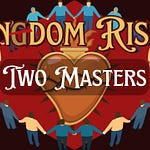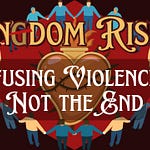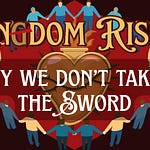In this episode of 'Creation's Paths,' non-binary sci-fi fantasy writer Charlie and their husband Brian discuss the complexities surrounding competition and its effects on community and unity. Using examples from sports, art, and politics, they explore how competition can bring people together or foster division and strife. The conversation highlights the importance of evaluating the outcomes of competitive events and finding ways to build a healthier community through constructive competition. The episode also delves into cultural aspects, using both historical and modern contexts to illustrate these ideas.
Tips or Donations here:
https://ko-fi.com/cedorsett
patreon.com/cedorsett
Substack: https://www.creationspaths.com/
For Educational Resource: https://wisdomscry.com
For all of the things we are doing at The Seraphic Grove go to Creation's Paths https://www.creationspaths.com/
Social Connections:
BlueSky https://bsky.app/profile/creationspaths.com
Threads https://www.threads.net/@creationspaths
Instagram https://www.instagram.com/creationspaths/
Transcript:
Charlie- New: [00:00:00] In this season of competition and games especially with the certain one that just happened over in France. There are a lot of ramifications for community and bringing people together. While good sportsmanship can bring people together. It can also tear people apart when factionalization and too much, shall we say team spirit gets brought in. So let's talk about competition, strife and community. On today's Creation's Paths.
Intro .
Hello everyone. My name is Charlie. I'm a non-binary scifi fantasy writer. I'm joined today by my wonderful husband, Brian.
Brian - New: Hello.
Charlie- New: I've been working a lot on a not so super secret [00:01:00] project. For https://wisdomscry.com, a whole bunch of stuff about Brigid is getting written up and copied in. I've also decided to grab a bunch of the prayers. From the Carmina Gadelica and put them in there. It's been quite a project. So I'm a little toasty.
Today, we're going to be talking about competition, strife and community. These really good together, especially when we're thinking about this season of Lúnasa. It is so traditional to have games. And back in the old times, they actually had like full on like chariot, races and stuff. And games, that happened during this time of year. It's my understanding that there are still places in Ireland, where they have fun fairs and competitions and stuff still to this day, which is awesome. But on a larger note.
Competition it's not a bad thing. I feel like we need to start there. Competition in and of itself is not a bad thing. It can. Lead. To all manner of bad things, it can [00:02:00] really get out of hand really easily. If not kept in check.
Brian - New: It is a tool. And like all tools. There is no moral attribution to it. It serves a function it is a social tool used for individuals to come together around what they're competing over. To test themselves to grow, to learn.
It's also one of the ways that children learn skills later in life. It is a tool. There is no moral attribution to it and of itself. But like you said, in today's society, a lot of the bad that comes into it is when people have those attachments.
Charlie- New: I want to disagree. Okay. But only slightly. do have a very moral listic view of competition, mainly because I feel that competition often comes into fields where it does not belong. That is a big problem. Now I don't have a problem with poets battling each other. [00:03:00] there's a long tradition of the filí doing their poetic battles against each other.
I have no problems with things like that. But when I see like an art show, how do you determine the best art?
Brian - New: Yeah. That's not the place for that kind of competition. An art show itself wouldn't be a competition. If you were to have a competitive art event like a person creating new culinary dish and then call that. a, competition. That's not using the tool. Appropriately. It's like trying to use a screwdriver as a, saw to cut a tree down. Like, you know, let's screwdriver we'll do it, but it's going to be terrible for everybody
Charlie- New: because the actual competition in a cooking competition is actually who made the favorite. D not the best. isn't the best dish.
Brian - New: The point of the competition is these individuals coming together in good spirit. Pushing themselves, pushing their boundaries. Testing and challenging [00:04:00] their proficiency in the thing and having fun doing it.
And so technically win or not is not the end game. That's not the end point. Yes, it's nice to be like, Hey, I won this award or whatever, back to the art example of the culinary example, those chefs that are doing that. You using the tool properly, grow and develop their craft so much more. A lot of people do from proper competitive events, but so much of it's done for the wrong reasons.
And I think that's where the problem comes in.
Charlie- New: Let's see, that's the problem in framing. They're not competitive events. And competitive racing is a competitive event. You are all doing the exact same thing. There is a measurable standard as to who wins. We can try to be as objective as we want to be about art music, food. Any of these kinds of things, movies, right.
We can try to be. As objective as we want to be, but there is no actual objective standard. True. [00:05:00] That can be applied there. It's always going to be a subjective standard. There are movies that I love that are arguably not great movies. I love the Godzilla movies, for example, and with a few rare exceptions that I would say our art, like our actual really good. Objectives really. Well shot. Masterpieces that have a lot of depth and meaning and things to say. Those are few and far between. And it wasn't likely Godzilla versus Kong, which is. A guy in an ape suit, fighting a guy in a lizard suit. And there's, it's just, it's silly. It's funny. It's fun. And if you don't groove on that kind of silliness. You're not going to enjoy that movie and you're going to rate it badly and it's not objectively worse. Of a film. Do you get what I'm saying? Yeah. I've seen a lot of movies that are technically proficient.
I'm not going to say the name of the filmmaker that I want to say, but there's a particular filmmaker that for anybody who [00:06:00] knows my film reviews will immediately. Know who I'm talking about. Who makes breathtakingly, stunningly beautiful movies. Almost every frame is a piece of art. They're gorgeous, gorgeous films that have no story, no characters. Just stuff happening. They're empty, vacant shells. That. Don't really do anything for me. But a lot of people like. This particular person. And like the movies that he makes. And this is where I think competition becomes problematic. Because. For example politics weren't in an election year in the United States.
Politics is not a competitive sport. No. It is supposed to be a debate over whether or not we want to do what this person is wanting or that person, or this party or that party, or what have you. We're supposed to be debating the merits of the positions put forward. But way too many people on every side.
And I do mean every side, because while we live in a two [00:07:00] party state, there are more than. Two factions.
They're playing for their team. They're not actually looking at any of the broader questions. They're not looking at. Any of the bigger things. This is where competition really becomes a problem. I don't care if my team wins in a situation like that. I care if. We make the country actually a better place. will, this actually make improvements who has the better plan for improvement. We see this a lot in church politics, especially, which is one of the things that. Frustrates me to no end with church politics. I don't care what your side is. We really shouldn't have sides. We're all in name, at least worshiping the same God, even though that gets argued about in a way that is frustratingly common. We're all technically working towards the same end goals. But factionalism comes in and this is the unhealthy side of. Sport [00:08:00] of competition. Is factionalism. I have no problems with somebody who really likes a certain sports ball team. And wants to root for that sports ball team. I do have a problem. When. Language like, and I hate the supporters of the other team, or I hate the city of the opposing team or the rival team. Or anything like that comes up. Why? That is unhealthy. Competition. There's nothing wrong with supporting your team.
Brian - New: Part of that, I guess is when looking at the fruits. That result from the competition. You can really tell if it's a good competition or bad competition. Is it a good fruit or a bad fruit? Is the end result Unity or separation. You can have sides in the structured frame of the competition, but in the end, the whole point is building community. If division, separation, factionalism is the end result. Then the competition has gone bad. It is sour. [00:09:00] Something is tainted in that fruit. That has resulted from it. And should be quickly evaluated reflecting upon discerned. To see what needs to be corrected so that it can result in unity and bringing people together in community building.
If people are coming together as a community, that's great. But if it's this community versus that community in the end, it's still not good. It's like the whole point of the Olympics will play Olympics was to get these separate nationalistic states. Before even nationalism was around his, as he states were rising in self identifying and us versus them, it was to bring them together. So that there could be community. So there could be piece of healing amongst these two separate communities. So they could. Have Intercommunity interaction, healthy interaction.
Charlie- New: You keep using the word unity. I think unity is one of the many misunderstood concepts in the world today.
I particularly like what Hagle had to say about. Unity. It's [00:10:00] something that I go to and it's become almost a mantra for me though. This is my wording of what he said, because if you've ever read Hagle, Hey, you'll never said anything simply that he could say in a lot of words,
Hagle. Argues. That you cannot have unity. Between similar or identical things. There is no such thing as unity. Between similar and identical things, you can only have unity in diversity. If everything is the same, if everything is too similar. Well, you actually have is conformity. Not unity. And the conformity and unity are not the same thing. Very different. And. While Hagle. It is. Not as accessible as some of his ideas should be for. The. General conversation. He's right here. The biggest problem with all of this is. We tend to choose conformity and label it unity. Very true. And this is [00:11:00] where competition. Can really be a problem because we are using. Very arbitrary things.
You know, I remember when I was a kid and my dad was trying to get me into baseball. He was a big fan of the St. Louis Cardinals. He was trying to get me to be a big fan of the St. Louis Cardinals. I started asking questions like, Oh, so this is the Missouri team, like yeah. Yeah. This is the Missouri team. So the players are from Missouri. No. So the players are all from the St. Louis area. So some are, some of them are from Illinois and some of them are from Missouri.
No, they're from all over the country. Some of them are even international players. Why is it a Missouri team then? Oh, because it's in the city of St. Louis.
Well, you could put anything in this city of St. Louis and say it's local. What makes it like, I couldn't understand this idea. Because if I'm supposed to have this regional affiliation, With this. Event this team. Shouldn't it reflect the region. I remember [00:12:00] saying to him once. If a college could field players from other schools, that doesn't make sense to me. They're not. Playing for their school, then they're just playing the game.
I still, have a bit of a problem, understanding this idea of, Not having more localized player bases for sports ball teams.
The problem that comes in and what I didn't understand as a child that I was trying to get at is this factionalism of this is the local team. When absolutely nothing about it made it local. The owners were not from the region. Most of the players were not from the region. The only thing that made it from the region is they played at a stadium. In the region. Technically. That didn't make sense. When you start thinking about. How competition often works. Unjust. Rivalries, if you will. And unjust factionalism often has some weird lie at the heart of it. Some weird distortion in there. So that you have [00:13:00] to believe some cognitive dissonance. That you have to accept two. Get into it. Now, I'm not saying that you can't love your local team because not all the players come from your local region. I was just as a child, trying to understand, well, what made them local? Because of all these things are not local.
What does that mean? That they're our team.
What does it mean? For any of the things that we have this factionalism about. A political party. We say shares ideas. But does it. When you actually look at the political parties as they exist in the United States. You start looking at. What people who are registered to that party think and believe on various subjects and what the policy proposals are of that party.
And this goes for all of the parties in the United States,
Brian - New: all two of them, we only have two major. This is also a winner. Take all greens in the libertarians and yeah.
Charlie- New: it's true for all of the political parties that we have here. They're a banner that people are rallying behind that aren't necessarily reflective of [00:14:00] the beliefs of the people that are even within the group itself, which is strange to me, especially for the smaller groups.
I can understand there being different than a larger group, because consensus has to be arrived at. But even for the smaller parties that we have, we, we see this kind of disconnect. In there.
We also see it from. A religious standpoint in what to. Members of various churches and religious communities believe. What do their creeds profess. What are they told what they have to believe. The most obvious example of this is especially in the United States. The majority of Roman Catholics in the United States are a pro-choice. And the Catholic church has staunchly pro-life.
That's , dissonance there. And I get that they're coming from a top-down model and I'm not wanting to get into all that. This ride or, die that we have for. Groups and organizations that. May or may not actually represent us. That we may or may not actually be a [00:15:00] part of. Is a strange thing and it's something we need to watch out for.
I do not like attending sports ball games. I find them dull. I find them boring. Over the years, I've had friends that have competed in various leagues. And I love going to their games. Why because I'm there to root for my friend. I don't care about this amalgamated team of whatever. Right because I don't know them.
I have no connection to them. I do care about. My friend, who's playing on the team.
And so I have a connection there. And that's where I think we really need to start asking ourselves. And interrogating our connection with competition. What is our connection to this competition? And how is it breeding? Strife potentially in our communities. I am a member of several religious groups. And orders. All of which allow you to be members of multiple. Works. So there's no strife there.
I have noticed in some groups I am treated differently because of my [00:16:00] association with other groups. That share 99% of their beliefs in common. One or 2% are different. And even those are just worded differently. They're not even really different. They're just different words are chosen. They come at it from a different angle or perspective.
That is an unfair. An unjust. Competition.
You can be a member of both of these groups, all three of these groups. You don't have to choose. One.
That gets to the real issue here in how competition breeds strife. When we pretend and often we are pretending. That we're engaged in a zero sum game.
When in reality. There are very few zero sum game.
Now, I'm sure you've heard this phrase and. Just to make sure that we're all on the same page. Checkers is a very good example of a zero sum game. There are a set number of pieces on the board. Who wins the person who captures the most of their [00:17:00] opponents. Pieces. Yes.
Yes. This is how it works. That's a zero sum game. There are only so many checkers on the board and yes, there are some versions of the rules where there are ways to get pieces back that have been lost and blah, blah, blah, blah, blah. But there are only so many there. You are fighting over a finite resource.
Most games are not struggling over a finite resource. There is no. Score cap. And when there is there's. An agreement on it. We're going to play Rummy to 500 plants. You negotiated ahead of time. Most things are not zero sum games.
Though they're often treated. Not only is if there are zero sum games. But that all games are winner. Take all games.
What is the winner? Take all game. It's a game where you guess what? I wonder it takes all, nothing is left over for anybody else.
The economy is often treated. As both a zero sum game. And. A winner take all game. Politics is often treated the same way. The problem is neither of these [00:18:00] actually are. When you're having an argument with someone. Which is a form of competition.
There's not always a zero sum. In there. Sometimes there is. Where are we going to go for dinner? that is a winner take all game. Unless you decide to go your separate ways and not have dinner together, which is both sides losing from my point of view.
Somebody is going to have to get up and give up their favorite choice or both people are, and you're gonna have to compromise on a middle ground place to go eat for dinner.
What movie are we going to watch tonight? There are compromises that can be had here.
A tie or a compromise is not a loss. And this is the poison. That an over competitive. Environment puts into people's minds.
Brian - New: Competition used. To create derision. It's bad competition. It's something that is, especially, in the states. Because the whole, like ties being a bad thing or being viewed as a loss, being taught to generation after generation after generation. It has poisoned a lot of the [00:19:00] minds into causing division and strife when it's not necessary. It's why discourse or arguments? Competitively done amongst two individuals. Oftentimes nowadays are so tainted and become so poisoned. Filled. Because of this fact that they think it's zero sum. When in reality, no, it's a discourse. It's challenging ideas and sharing ideas and challenging. The shared ideas amongst each other, amongst the parties involved in that competition.
Charlie- New: If a good game is had by all. Everybody wins. Yeah. Yes, the score may show something else, right? But, and there may be a trophy or a prize or something like that. And. I'm not saying that those wins don't count and I'm not someone who. Though I'm going to be characterized as somebody saying, just hand out participation, trophies, trophies for everything.
Brian - New: A great example of this in pop culture. Is great British baking show. I think this is part of why it was so popular [00:20:00] because. It was a competition baking show. Yes, they were competing. There is a winner at the end. When in reality, all of the bakers, when they have all grown, they've all gotten stronger, a lot of community and comradery has formed amongst the members. Fostering. Stronger community. That's a win it doesn't win. And that's where all parties win.
Charlie- New: That's really the struggle that we're having right now. This is really the issue that faces our country and our world more than anything else we're competing. Over things that don't matter. We're still competing over oil resources.
When we need to be moving away from that. We're competing over whether or not settled science is settled. Science. I'm not one of those people that says, I believe authority figures because they're authority figures, but. If the data is in the data is in. Like when enough people have checked and checked and double checked and triple checked. The idea that everyone else is lying and only a [00:21:00] few people know the truth at a certain point. You have to realize that you're dipping into the well of conspiracy theory. But science is a competitive sport. It is. I have a theory. Here's my evidence. And then there's this thing called peer review, which a lot of people don't understand what that is. But peer review is literally prove me wrong.
And people tear through the data they tear through the methodology that was used to not only collect the data. But to compile it and to figure out the results from it.
Even after it passes peer review, that still doesn't mean it's true. That just means, okay. We haven't found any faults in it. If you really want to see how peer review and science works. Go to your favorite. App of finding information, whether that's a search engine or YouTube or something. And just search the phrase spinosaurus.
You'll see how science actually works. It is a long protracted debate. [00:22:00] Where evidence mounts. Over time. What spinosaurus and aquatic dinosaur.
Here's a paper pass. Peer review says yes. Here's paper pass. Peer review says no. Here's a paper comparing the two and found all kinds of flaws with both of them. Here's another paper that says this there's another paper that says that. And this argumentation is the point of it. Here's my data. Here's how I'm. You using the data? Here's how I'm looking through the data and when there's a rich, robust argument, you can see it.
It's there. People even who say I can't question there. Data. They seem to have collected their data, find their methodology through three, five. But this doesn't seem to work for me. I don't know why, but it just doesn't you still see those dissents in there even when they can't find a exact flaw to point their finger at. That's how real competition works. It's all real competition should work.
They don't have to be [00:23:00] wrong because I disagree. They could be wrong. But. Now the ball is in my court. And I have to prove them wrong. I have to prove. That's something else is going on here. Something else is happening. That the data. It's not actually showing what they think the data is showing.
That's how argumentation works. That's should be how a lot of our political debates. Get answered. I have a theory. This is how things work. Then we put those theories into practice called laws. Bill's what have you. And we test them out.
Did tax policy a. Affect the economy. Go well or not. There is a data. We have to be honest about what the data says. Because some of my favorite theories have been found. Some of my favorite theories have been found wrong.
Brian - New: Oftentimes for me, a lot of my theories have been found. You know what. There's definitely good things here, there were huge glaring flaws. And then. Further studies. Study needs adjusting and like [00:24:00] loopholes needed to be closed up. Because giant loopholes.
Charlie- New: These are the things that we need to be bearing in mind and considering anytime we're entering competition, it's not life or death. We're not fighting in gladiatorial arenas, even though we'd like to use that wording. This isn't war. I'm sorry. Your sports ball game is not war. And especially right now hearing that language is very grading on me. You want to help keep me from caring about your sports ball.
Keep using more analogies. With everything that's going on around the world right now. No. This is not warfare. It was never a good analogy. It could be a good analogy.
We know of several groups that have staged games. To settle conflicts. So that nobody has to die.
I'm all for let's have a cricket match or a soccer match, or some mutually agreed upon sports match. Instead of. Bombing a city to rubble. If we want to do that to solve conflict, but we're not doing that.
That those stakes are not that [00:25:00] high. And especially in our local communities and our families amongst our friends, friend groups. It's not that high. And with the advent of streaming and the competition that is supposedly there.
It just keeps getting ratcheted up and up and up. Instead of building community. Instead of building us up. As we're all leveling up our skill. We're breeding more and more dissension. Except for where we aren't. And there are beautiful places. Where we're not where people are. Sharing what they've learned and here's how I did this.
Here's how I may made this happen. And there's a whole vibrant community of people doing that as well. But we need less strife. We just do. We have enough of it.
Most of it that we do have is unnecessary to begin with, but that's a whole other. Argument for a whole other day.
Brian - New: To go back and summarize all of this. The secret to competition. As we are all secretly competing. For Ki [00:26:00] tov. To make. Good. And to make it better. make good. Better. That is actually it. That is the secret of competition. Two different opposing sides or more. Or groups. To make. The whole thing better. Yeah.
Charlie- New: That's what I actually loved about the. Apple. Top 100 albums of all time list. And that's in the way they phrased it. These aren't the best. Albums of all time. They're the most influential. There are people's most favorite? They did not put forward a criteria when they sent the ballots out. However you want to rake these. This could just be your personal favorite, the ones you just load up your library and see which ones you've listened to most over time and put them down on the list. They put four.
No. Objective criteria. Anybody could put their own things on the list. And while I could argue for things that I love, that I would definitely have had on the list. Or things that were on the list that I felt. Should have been higher for various [00:27:00] reasons. Even the album's on there that I don't like. I can't argue with them being on there. It's because they're not trying to instill a false dichotomy onto those. It's not, these are the greatest albums of all time. No. W what is the greatest album of all time?
I have no idea. I don't even know how to even start. Contemplating that subjective art again. Yeah.
Brian - New: The beauty of the competition was in participating in it. As I had certain. Biased beliefs challenged. I was able to make those better.
Charlie- New: It wasn't put forward as a competition. , they're top 10 are not the greatest ever.
A lot of what the conversation was around it because they put out. A really lovely podcast to go along with it. Was, why is this here? Why did this show up here? And I kind of think it would be fascinating to do a ballot like that every 10 years or so. To see how it changes over time.
Do things go up. Go down. What new things get added. Over [00:28:00] time. As new music's being made. What things get lost? What old things get rediscovered and get brought back up to the top. That's an interesting. use for something like that. But most of us like that are just a vanity project that a bunch of people get into a room and just pick things. Put him into an arbitrary order. And again, I'm not saying their methodology was perfect.
I'm just saying it's a very interesting. Way to do this in a non-competitive way. It actually did create a very competitive list.
I didn't actually see a lot of strife about it. Usually when a top 100 lists like that comes out, there's a lot of arguing. Yeah. I didn't actually see a lot of arguing this time. I find that fascinating.
I hope you got something out of this. This is something we wanted to talk about and. It's not an easy topic to get into. And it's one that we might revisit again next year at Lúnasa, and maybe find a better way in, or a different way in. Let me know what you think.
How do competitions strife in community work? How should they work and how can we. Eliminate more [00:29:00] strife from our lives.
Until next time. Maybe blessing sunlight, fill your life. Amen. Amen.












